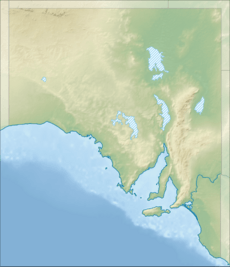Ediacara Conservation Park facts for kids
Quick facts for kids Ediacara Conservation ParkSouth Australia |
|
|---|---|
|
IUCN Category VI (Managed Resource Protected Area)
|
|
| Nearest town or city | Leigh Creek |
| Established | 11 November 1993 |
| Area | 22.12 km2 (8.5 sq mi) |
| Visitation | "a small number of visitors each year" (in 2012) |
| Managing authorities | Department for Environment and Water |
| See also | Protected areas of South Australia |
The Ediacara Conservation Park is a special protected area in South Australia, Australia. It's about 30 kilometers (19 miles) southwest of a town called Leigh Creek. This park is very important because it protects some of the oldest and most amazing fossils on Earth.
What Makes Ediacara Special?
This conservation park is a really important place for several reasons. It helps protect incredible ancient fossils, important cultural sites, and unique plants.
Ancient Fossils
The park is famous for its "Ediacaran biota" fossils. These are fossils of very old, soft-bodied sea creatures. They are super important because they show us what life was like on Earth hundreds of millions of years ago, long before dinosaurs! Scientists from all over the world study these fossils.
Cultural Significance
The Ediacara Conservation Park also protects places that are very important to the Adnyamathanha people. They are the traditional owners of this land. These sites hold deep cultural meaning and history for them.
Mining History and Plants
You can also find old mining history within the park. There are remnants from the Ediacara mineral field. The park also protects a special type of plant called "chenopod" habitat. These plants are well-suited to the dry conditions of the area.
History of the Park
The Ediacara Conservation Park has been protected for a long time, with its status growing over the years.
How the Park Was Created
The land was first set aside as a fossil reserve way back in 1958. Then, in 1993, it became a conservation reserve. Finally, on April 26, 2007, it was officially named the Ediacara Conservation Park. This happened under a law called the National Parks and Wildlife Act 1972.
Growing the Park
The park became much bigger in 2019. On March 28, the Government of South Australia bought a huge piece of land next to the park. This added about 60,000 hectares (148,263 acres) to the park. This made the conservation park ten times larger than it was before! This expansion helps protect even more of the important fossils and natural areas.
Understanding the Name
The name "Ediacara" comes from the language of the Adnyamathanha people. The original name is "Ithiaka-na-danha." In their language, "Ithi" means 'Zebra Finch,' and "aka – na-danha" means 'to come out.' So, the name describes something about zebra finches coming out in that area.
Park Protection Status
The Ediacara Conservation Park is recognized internationally for its importance.
IUCN Category VI
The park is classified as an IUCN Category VI protected area. This means it's a protected area where people can use natural resources in a sustainable way. The main goal is to protect the area's ecosystems and cultural values.
Heritage Listing
The fossil reserve part of the park is also listed on the South Australian Heritage Register. This means it's officially recognized as a place of special historical and cultural importance in South Australia.
 | Delilah Pierce |
 | Gordon Parks |
 | Augusta Savage |
 | Charles Ethan Porter |


